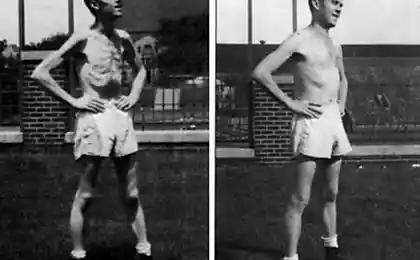172
What is the cause of emotional overeating
At least once in our lives, each of us indulged in something tasty when we were in a bad mood. Unfortunately, for some people, this becomes a habit that is very difficult to cope with. This is because people resort to all sorts of diets and try to limit themselves to eating when it comes to the subconscious. Today we will try to understand and understand what are the causes of overeating, and whether it is possible to cope with this problem.

Why do some people eat when they are not physically hungry? A person may start eating too much under stress. When we are sad, our favorite cake seems like a lifeline in an ocean of injustice.

This is normal, everyone has the right to reward themselves for passing a difficult exam or after a hard day at work. But not everyone encourages themselves to eat and not on a regular basis. If a person regularly begins to bite his problems and experiences, he begins to have problems with health, excess weight, self-esteem.

Emotional overeating is a psychological state in which a person tries to compensate for life’s failures with food. The reason for this can be any uncomfortable situation. If a person eats poorly and sleeps little, while he lives in a fast rhythm, then eating fatty and sweet foods can become a habit. All because in this way a person replenishes strength and energy. During stress, cortisol is produced, this hormone increases appetite and contributes to the accumulation of fat in the body.

In addition to strong negative emotions that cause emotional overeating, experts note other aspects. For example, many of us find it difficult to refuse a cupcake offered at a party so as not to offend relatives or friends.

One of the most popular reasons is boredom. Do you remember how many times you went to the fridge when you stayed home on the weekend? This habit can appear in active people who do not know what to do when they have a free moment.

Sometimes people, instead of doing unpleasant things, start eating. I’m going to eat and start writing my thesis. This is how a person postpones unpleasant duties.
Overeating, based on emotions, can be a consequence of a habit formed in childhood. For example, if a child is encouraged to have ice cream or cake after they have done all the homework or cleaned up their room.

Emotional overeating is not perceived as a problem until its consequences become apparent. It is possible to distinguish this state from real hunger. Physiological hunger appears gradually, but if the desire to eat appears suddenly, then it is associated with emotions.
Emotional hunger comes from the head: a person first thinks about food, and then it seems to him that he is really hungry. There are no physiological prerequisites for this.

When you feel like you need to eat something, pay attention to the food. If you're willing to eat something nutritious like buckwheat or soup, any healthy food, then you're hungry. If you want something very high-calorie and not very useful, you need to work with emotions.

A conscious approach to food can fix the situation. First, you can start a diary, which will indicate how much and what you ate during the day. If overeating is caused by boredom, you need to distract yourself with some interesting activity: read a book, go shopping, do sports.
https://www.youtube.com/watch? v=mstGWq3QcZw
New habits will be formed and emotions will be controlled. Once you understand the cause of emotional overeating, no diets are needed. You just stop focusing on food all the time.

Why do some people eat when they are not physically hungry? A person may start eating too much under stress. When we are sad, our favorite cake seems like a lifeline in an ocean of injustice.

This is normal, everyone has the right to reward themselves for passing a difficult exam or after a hard day at work. But not everyone encourages themselves to eat and not on a regular basis. If a person regularly begins to bite his problems and experiences, he begins to have problems with health, excess weight, self-esteem.

Emotional overeating is a psychological state in which a person tries to compensate for life’s failures with food. The reason for this can be any uncomfortable situation. If a person eats poorly and sleeps little, while he lives in a fast rhythm, then eating fatty and sweet foods can become a habit. All because in this way a person replenishes strength and energy. During stress, cortisol is produced, this hormone increases appetite and contributes to the accumulation of fat in the body.

In addition to strong negative emotions that cause emotional overeating, experts note other aspects. For example, many of us find it difficult to refuse a cupcake offered at a party so as not to offend relatives or friends.

One of the most popular reasons is boredom. Do you remember how many times you went to the fridge when you stayed home on the weekend? This habit can appear in active people who do not know what to do when they have a free moment.

Sometimes people, instead of doing unpleasant things, start eating. I’m going to eat and start writing my thesis. This is how a person postpones unpleasant duties.
Overeating, based on emotions, can be a consequence of a habit formed in childhood. For example, if a child is encouraged to have ice cream or cake after they have done all the homework or cleaned up their room.

Emotional overeating is not perceived as a problem until its consequences become apparent. It is possible to distinguish this state from real hunger. Physiological hunger appears gradually, but if the desire to eat appears suddenly, then it is associated with emotions.
Emotional hunger comes from the head: a person first thinks about food, and then it seems to him that he is really hungry. There are no physiological prerequisites for this.

When you feel like you need to eat something, pay attention to the food. If you're willing to eat something nutritious like buckwheat or soup, any healthy food, then you're hungry. If you want something very high-calorie and not very useful, you need to work with emotions.

A conscious approach to food can fix the situation. First, you can start a diary, which will indicate how much and what you ate during the day. If overeating is caused by boredom, you need to distract yourself with some interesting activity: read a book, go shopping, do sports.
https://www.youtube.com/watch? v=mstGWq3QcZw
New habits will be formed and emotions will be controlled. Once you understand the cause of emotional overeating, no diets are needed. You just stop focusing on food all the time.























